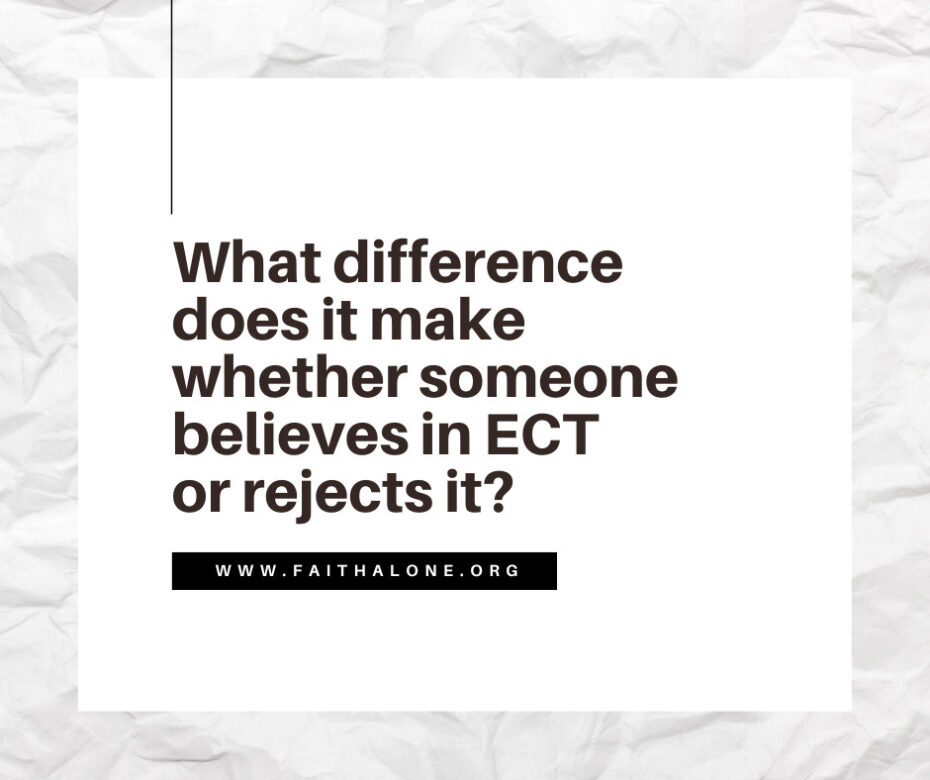Eternal Conscious Torment (ECT) is the teaching of Scripture (cf. John 3:14-18; Heb 9:27; Rev 14:11; 20:15). However, many schools and many pastors are now rejecting ECT in light of various other views.
Those other views include universalism (everyone will eventually be saved), conditional immortality (= annihilationism), and unconscious torment (like an eternal coma).
Back in the early 90s, the GES board was tasked to iron out a doctrinal statement that covered more issues than our affirmations of belief. After it was done by a committee, we discovered that there was no statement on ECT. Zane Hodges was asked to write that statement.
A few weeks before the board meeting in which we would discuss that statement, I spoke to two of the GES board members about this issue. They both told me that they did not believe in ECT. These were both Th.M. graduates from DTS. We had been contemporaries in seminary. (They did not say what they thought God would do with unbelievers. They were convinced, however, that ECT was not true.)
I was surprised. I thought all DTS graduates believed in ECT back then.
Fast forward twenty years. I was talking with a Free Grace leader about this issue. He confided in me that he did not think that any humans would be in the lake of fire, that it was for fallen angels and demons only. He thought that all humans who died in unbelief would be annihilated. Again, this was totally unexpected. I thought all Free Grace people believe in ECT.
It is possible to promote justification by faith alone and yet hold to universalism, conditional immortality, or unconscious torment.
The Scriptures are clear that the unsaved dead will be raised and judged at the Great White Throne Judgment, and then they will spend eternity in the lake of fire: “Anyone not found written in the Book of Life was cast into the lake of fire” (Rev 20:15).
John 3:16-18 is clear that one must believe in Christ for everlasting life in order to avoid eternal condemnation.
People get into the Book of Life when they believe on the Lord Jesus Christ for the salvation He guarantees. Those who do not believe in the Lord Jesus Christ for everlasting life during this life will spend eternity in the lake of fire in eternal conscious torment.
Why do people reject ECT? They reason in this way:
Major premise: God is just in all He does.
Minor premise: Eternal conscious torment is unjust.
Conclusion: God will not consign anyone to eternal conscious torment.
That minor premise is thought to be true, based on the feelings of the pastors and theologians who suggest it. That premise is not based on Scripture. Instead, we ought to reason in this way:
Major premise: God is just in all He does.
Minor premise: God is going to consign unbelievers to eternal conscious torment.
Conclusion: Eternal conscious torment is just.
I argue in my book The Ten Most Misunderstood Words in the Bible (see here) that the eternal experience of unbelievers will be tolerable—more tolerable for some and less tolerable for others (Matt 10:15; 11:22, 24). But tolerable for all. It will be torment. It will be eternal and conscious. But it will be something tolerable.
The Bible tells us almost nothing about the nature of the torment in the lake of fire. But it is clear that it is eternal and conscious torment.
We may debate the nature of this torment, but we cannot reject it without rejecting God’s Word.
One final question. What difference does it make whether someone believes in ECT or rejects it? First, there is little or no sense of urgency to evangelize the lost if everyone will eventually be saved. Second, even in the cases of conditional immortality and unconscious torment, there is a reduced concern for the fate of unbelievers. Third, it is always a bad thing to twist the Scriptures to fit what we think is reasonable. When one rejects ECT, he is likely to start rejecting other Biblical teachings which don’t seem reasonable to many today, like only men as elders in the local church, women not being permitted to preach in the church service, husbands as the head of their wives, and marriage only between a man and a woman.
John the Baptist put it this way: “He who believes in the Son has everlasting life; and he who does not believe the Son shall not see life, but the wrath of God abides on him.” Ed Blum commented on John 3:36,
“3:36. Man has only two options: trust in the Son or reject the Son (cf. vv. 16, 18). Unbelief is tragic ignorance, but it is also willful disobedience to clear light. God’s wrath is mentioned only here in the Fourth Gospel (but cf. Rev. 6:16–17; 11:18; 14:10; 16:19; 19:15). “Wrath,” God’s necessary righteous reaction against evil, remains (menei) on the unbeliever. This wrath is future, but it also exists now. Endless sin and disobedience will result in endless punishment (Matt. 25:46)” (“John,” in The Bible Knowledge Commentary, p. 284).


